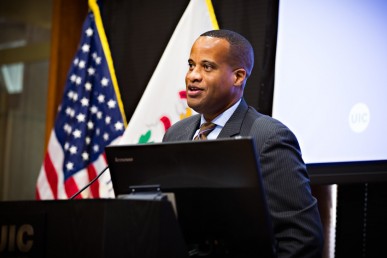Federal grant to help UIC promote Chicagoland green economic development

Jay Williams, U.S. assistant secretary of commerce for economic development, speaking at UIC. Photo: Elizabeth Monge
The University of Illinois at Chicago is one of 24 U.S. colleges and universities sharing in more than $2.5 million in federal grants to promote innovation and strengthen regional economies.
As one of the grantees under the U.S. Economic Development Administration’s (EDA) 2016 University Center Economic Development Competition, UIC’s Natalie P. Voorhees Center for Neighborhood and Community Improvement will receive $54,000 annually for a five-year program to develop a model to promote green economic development in the Chicago region with a focus on manufacturing and workforce development.
Jay Williams, U.S. assistant secretary of commerce for economic development, joined UIC officials to announce the investment at a campus event today.
“EDA’s University Center program is critical to harnessing the resources of our colleges and universities to support the regional economic development strategies and public-private partnerships that are so vital to helping America stay innovative and competitive,” said Williams. “We commend the University of Illinois at Chicago for launching a University Center program that will provide technical assistance to businesses and entrepreneurs to help them develop effective strategies for growth, sustainability, and global competitiveness.”
The grant, with matching funds from UIC, will support the Voorhees Center’s research and technical assistance in workforce development, green industry development, financing strategies, and regional communication and marketing.
“Green economic development strives to create jobs while protecting the environment and focusing on industry that is resource-efficient and low-carbon,” said Janet Smith, co-director of the Voorhees Center and lead researcher on the project. “The combination of industry and environment makes the region an ideal candidate to transition to new and green economic development.”
Over the course of the project, the Voorhees Center will team with UI LABS-based Digital Manufacturing and Design Innovation Institute (DMDII) to work with the area’s economic development districts, municipalities, non-profit organizations, small businesses and entrepreneurs.
“This is a really natural partnership for us, in part because UI LABS is a consortium of academic and industry partners from around the country, but very importantly here in this region,” said Haley Stevens, director of workforce development and education outreach at DMDII. “This partnership is embarking on a new era for neighborhoods that have been experiencing acute distress.”
The center’s program will complement the ongoing work of groups such as the Southeast Environmental Task Force, Chicago Southland Economic Development Corporation, and Cook County’s Bureau of Economic Development by building on the area’s strengths in transportation and logistics, manufacturing and technology, and environmental spaces.
Some of the region’s current challenges include population polarization by income, race and ethnicity, and unemployment due to a mismatch between employer needs and labor force skills.
“The development of economic opportunities across the region is uneven,” said Smith, associate professor of urban planning and policy. “We aim to support the creation of a comprehensive and balanced model for eco-friendly green development.”
This year’s competition was open to higher education institutions and consortia of accredited institutions in states supported by Economic Development Administration’s Chicago and Philadelphia regional offices.
The Voorhees Center, part of the UIC College of Urban Planning and Public Affairs, works collaboratively with a diverse set of partners to provide technical assistance, conduct research, and generate new knowledge in comprehensive community development and neighborhood quality-of-life issues. Since 1978, the center has engaged residents, leaders and policymakers seeking effective strategies for advancing community livability and vitality.
The mission of the U.S. Economic Development Administration (EDA) is to lead the federal economic development agenda by promoting competitiveness and preparing the nation’s regions for growth and success in the worldwide economy. An agency within the U.S. Department of Commerce, EDA makes investments in economically distressed communities in order to create jobs for U.S. workers, promote American innovation, and accelerate long-term sustainable economic growth.
